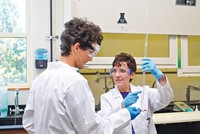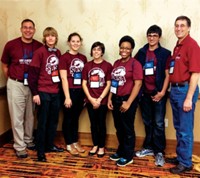Advertisement
Grab your lab coat. Let's get started
Welcome!
Welcome!
Create an account below to get 6 C&EN articles per month, receive newsletters and more - all free.
It seems this is your first time logging in online. Please enter the following information to continue.
As an ACS member you automatically get access to this site. All we need is few more details to create your reading experience.
Not you? Sign in with a different account.
Not you? Sign in with a different account.
ERROR 1
ERROR 1
ERROR 2
ERROR 2
ERROR 2
ERROR 2
ERROR 2
Password and Confirm password must match.
If you have an ACS member number, please enter it here so we can link this account to your membership. (optional)
ERROR 2
ACS values your privacy. By submitting your information, you are gaining access to C&EN and subscribing to our weekly newsletter. We use the information you provide to make your reading experience better, and we will never sell your data to third party members.
Education
Hooked On Teaching
Mentors describe the U.S. National Chemistry Olympiad study camp as an 'adrenaline rush'
by Linda Wang
November 17, 2008
| A version of this story appeared in
Volume 86, Issue 46

How does it feel to be a mentor for the U.S. National Chemistry Olympiad study camp?
Kara Pezzi, who was head mentor this year and is a chemistry teacher at Appleton East High School, in Wisconsin, doesn't sugarcoat the reality: "You basically run on adrenaline for two-and-a-half weeks. Then you go home and crash."
Northwestern University chemistry lecturer Owen Priest, who was a mentor for the first time this year, describes the experience this way: "If you had told me a month ago that I was going to cover 21 chapters of organic chemistry in a few hours of lecture, I would have told you that you were crazy."
Will Lynch, a mentor and chemistry professor at Armstrong Atlantic State University, in Savannah, Ga., who has endless amounts of energy, admits that even he gets tired by the blinding pace of camp.
But the instructors all agree that they wouldn't have volunteered for the job if they didn't truly believe that they were helping the students who attend the camp to realize their full potential. Plus, they say, it's a lot of fun, and these kids help to energize and inspire them.
"It's really a gift to be able to spend two weeks with these kids and get to know them and appreciate how hard they work and how sincere they are about their studying, but also how nice they are and how well they treat one another," Lynch says.
Mentors serve a three-year term, teaching lecture and lab at the U.S. National Chemistry Olympiad study camp. The camp, which is organized by the American Chemical Society, takes place during two weeks each June at the Air Force Academy, in Colorado Springs, Colo. Second- and third-year mentors accompany the U.S. team to the International Chemistry Olympiad.
Mentors can be university professors or high school teachers. Pezzi admits that she felt stretched by the depth of the material. "I knew it was going to be extremely challenging because I would be teaching chemistry that's well beyond what I teach in high school," she says.
In fact, the program struggles to attract high school teachers to participate as mentors. "High school teachers don't apply for this because they think they don't know the content as well as you need to know it here," Pezzi says.
Cecilia Hernandez, ACS national coordinator for the U.S. National Chemistry Olympiad, says the society is exploring options for recruiting more high school teachers to the program. She points out that ACS routinely advertises the opportunity in journals, magazines, and other publications that go out to high school teachers.
Pezzi, Lynch, and Priest all say the experience has helped make them better teachers. For example, Pezzi says she teaches electrochemistry in Advanced Placement chemistry at her high school but never had to teach it to the depth that she taught it at the study camp. "I'm truly understanding it a lot better than three years ago," she says. "That makes my students at Appleton East get a better education, too."
For more information on how to become a mentor, view: Chemistry Olympiad Mentors Wanted. To obtain an application form, click here. The deadline for applications for 2010 is Jan. 27, 2009.
Cover Story
- Chemistry, Culture, and Camaraderie The international chemistry olympiad offers an experience worth its weight in gold
- Training Ground Competition is fierce at the U.S. National Chemistry Olympiad study camp




Join the conversation
Contact the reporter
Submit a Letter to the Editor for publication
Engage with us on Twitter